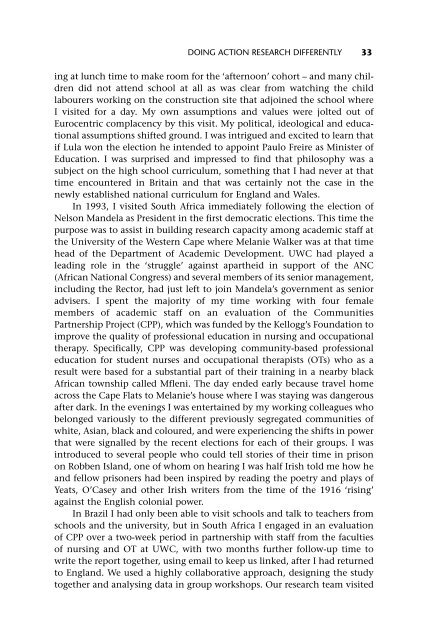Action Research A Methodology for Change and Development
Action Research A Methodology for Change and Development
Action Research A Methodology for Change and Development
You also want an ePaper? Increase the reach of your titles
YUMPU automatically turns print PDFs into web optimized ePapers that Google loves.
DOING ACTION RESEARCH DIFFERENTLY 33<br />
ing at lunch time to make room <strong>for</strong> the ‘afternoon’ cohort – <strong>and</strong> many children<br />
did not attend school at all as was clear from watching the child<br />
labourers working on the construction site that adjoined the school where<br />
I visited <strong>for</strong> a day. My own assumptions <strong>and</strong> values were jolted out of<br />
Eurocentric complacency by this visit. My political, ideological <strong>and</strong> educational<br />
assumptions shifted ground. I was intrigued <strong>and</strong> excited to learn that<br />
if Lula won the election he intended to appoint Paulo Freire as Minister of<br />
Education. I was surprised <strong>and</strong> impressed to find that philosophy was a<br />
subject on the high school curriculum, something that I had never at that<br />
time encountered in Britain <strong>and</strong> that was certainly not the case in the<br />
newly established national curriculum <strong>for</strong> Engl<strong>and</strong> <strong>and</strong> Wales.<br />
In 1993, I visited South Africa immediately following the election of<br />
Nelson M<strong>and</strong>ela as President in the first democratic elections. This time the<br />
purpose was to assist in building research capacity among academic staff at<br />
the University of the Western Cape where Melanie Walker was at that time<br />
head of the Department of Academic <strong>Development</strong>. UWC had played a<br />
leading role in the ‘struggle’ against apartheid in support of the ANC<br />
(African National Congress) <strong>and</strong> several members of its senior management,<br />
including the Rector, had just left to join M<strong>and</strong>ela’s government as senior<br />
advisers. I spent the majority of my time working with four female<br />
members of academic staff on an evaluation of the Communities<br />
Partnership Project (CPP), which was funded by the Kellogg’s Foundation to<br />
improve the quality of professional education in nursing <strong>and</strong> occupational<br />
therapy. Specifically, CPP was developing community-based professional<br />
education <strong>for</strong> student nurses <strong>and</strong> occupational therapists (OTs) who as a<br />
result were based <strong>for</strong> a substantial part of their training in a nearby black<br />
African township called Mfleni. The day ended early because travel home<br />
across the Cape Flats to Melanie’s house where I was staying was dangerous<br />
after dark. In the evenings I was entertained by my working colleagues who<br />
belonged variously to the different previously segregated communities of<br />
white, Asian, black <strong>and</strong> coloured, <strong>and</strong> were experiencing the shifts in power<br />
that were signalled by the recent elections <strong>for</strong> each of their groups. I was<br />
introduced to several people who could tell stories of their time in prison<br />
on Robben Isl<strong>and</strong>, one of whom on hearing I was half Irish told me how he<br />
<strong>and</strong> fellow prisoners had been inspired by reading the poetry <strong>and</strong> plays of<br />
Yeats, O’Casey <strong>and</strong> other Irish writers from the time of the 1916 ‘rising’<br />
against the English colonial power.<br />
In Brazil I had only been able to visit schools <strong>and</strong> talk to teachers from<br />
schools <strong>and</strong> the university, but in South Africa I engaged in an evaluation<br />
of CPP over a two-week period in partnership with staff from the faculties<br />
of nursing <strong>and</strong> OT at UWC, with two months further follow-up time to<br />
write the report together, using email to keep us linked, after I had returned<br />
to Engl<strong>and</strong>. We used a highly collaborative approach, designing the study<br />
together <strong>and</strong> analysing data in group workshops. Our research team visited

















